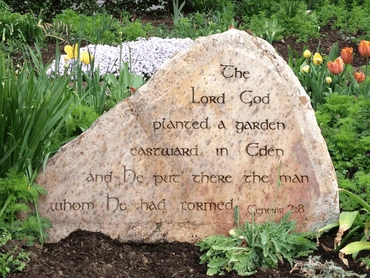Explanation of Genesis 2:15
작가: Brian David

In some ways, this verse expresses the pinnacle of human existence, the most beautiful, joyous state we have ever experienced: people at their purest and most loving living in a state of love and wisdom given them by the Lord.
This happened thousands of years ago, before the beginning of recorded history, in what the Writings call the Most Ancient Church, represented here by "man." A garden represents the intellect and Eden represents love, so the man in the Garden of Eden represents people pure of heart in a state of love to the Lord and the wisdom that comes from that love.
It's interesting that the man is to "dress" the garden ("serve" would be a more literal translation) and "keep" it. "Serving" in the Bible generally represents a more external spiritual state serving a more exalted one. "Keeping" means expressing higher spiritual things through lower ones, including external forms of worship. It seems, then, that the people of the Most Ancient Church were to serve the love in the garden and express the wisdom coming from that love.
The Writings also say directly that this means the love and the wisdom were not their own, but were from the Lord, and that they knew it to be true.
(참조: Arcana Coelestia 122, 123, 124)
Arcana Coelestia #694
694. Just as heaven, deriving as it does from the Lord, constitutes through mutual love one human being and one soul so to speak, and consequently has one end in view, which is to preserve and save all men eternally, so conversely does hell, deriving as it does from the proprium, constitute through self-love and love of the world, that is, through hatred, one devil and one frame of mind (animus), and consequently has one end in view, which is to destroy and condemn all men eternally. That this is the nature of their endeavours I have perceived thousands and thousands of times. Unless therefore the Lord were preserving everybody in every fraction of a moment, man would perish.






